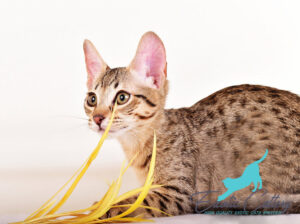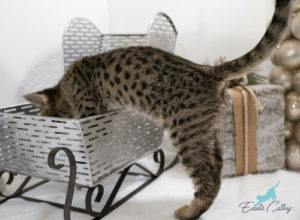How to Vaccinate Your Savannah Cat: A No-Nonsense Guide
You got yourself a Savannah cat—one of the coolest and most unique breeds out there. But with great felines come great responsibilities, and one of the biggest is keeping your exotic cat healthy. That means Vaccinate Your Savannah cat. But let’s face it, the world of vaccines can be confusing. Modified live vaccine vs. killed vaccine? FVRCP vaccine? Rabies shots? It’s a lot to take in.
So, let’s break it down.
Understanding Your Savannah Cat’s Vaccination Needs
Savannah cats are not your average house cats. They’re a mix of domestic cats and serval, a wild African feline. That mix gives them a unique immune system—strong, but different from your typical tabby. To keep them healthy, you’ve got to follow a specific Savannah cat vaccination schedule.
So, what are we protecting them against?
The Big Two: FVRCP and Rabies
First up, the FVRCP vaccine. This is your cat’s shield against feline viral rhinotracheitis, calicivirus, and panleukopenia. Fancy names, but here’s the deal: These diseases are nasty. Panleukopenia, for instance, is often called feline distemper—a killer if left untreated. Feline viral rhinotracheitis and calicivirus can make your cat seriously sick too. That’s why this vaccine is non-negotiable.
Then there’s the rabies vaccine. This isn’t just about keeping your cat safe; it’s about keeping you, your family, and even your neighbors safe. Rabies is fatal and can spread to humans. In many places, it’s the law to vaccinate your cat against rabies. But even if it weren’t, it’s just good sense.
The Vaccination Schedule: Kittens vs. Adults
When you’re dealing with a kitten, the cat vaccination frequency is higher. Kittens need multiple shots to build up their immunity. The FVRCP vaccine usually starts at around 6-8 weeks of age and is given every 3-4 weeks until the kitten is about 16 weeks old. Rabies vaccines typically happen around 12-16 weeks.
For adult Savannah cats, you’re looking at booster shots. Generally, the FVRCP vaccine is given every 1-3 years, depending on your vet’s advice and your cat’s lifestyle. The same goes for the rabies vaccine.
Killed Vaccines vs. Modified Live Vaccines (MLV): What’s the Difference?
Alright, here’s where it can get a bit tricky—killed vaccines vs. modified live vaccines (MLV). So, what’s the difference?
 Killed Vaccines: The Basics
Killed Vaccines: The Basics
Killed vaccines are exactly what they sound like. The virus or bacteria in the vaccine is dead, so it can’t cause the disease. These vaccines are generally considered very safe, which is why they’re often recommended for cats with weaker immune systems or those with chronic health issues.
But there’s a trade-off. Killed vaccines often require adjuvants—extra ingredients that help boost the immune response. Sometimes, these adjuvants can cause cat vaccine reactions like swelling or soreness at the injection site.
Modified Live Vaccines (MLV): The Basics
Modified live vaccines (MLV) contain a live, but weakened form of the virus. Because the virus is alive, even in its weakened state, it prompts a stronger and longer-lasting immune response. That means fewer boosters and potentially better protection.
But, because it’s a live virus, there’s a very small risk it could cause a mild version of the disease, especially in cats with compromised immune systems. However, in most healthy cats, MLVs are safe and effective.
Choosing the Right Vaccine for Your Savannah Cat
So, how do you decide between killed vaccines and MLVs? It boils down to your cat’s health and lifestyle.
If your Savannah cat is generally healthy and has a strong immune system, MLVs might be the way to go. They require fewer boosters and provide solid protection.
But if your cat has any health issues or you just want to play it safe, killed vaccines could be the better choice. Yes, they might need more frequent doses, but they’re super safe, especially if your cat is at risk of any vaccine reactions.
Step-by-Step Guide to Vaccinating Your Savannah Cat
You’ve decided on the type of vaccine—killed vaccines or modified live vaccines (MLV)—and now it’s time to get down to business. Vaccinating your Savannah cat is more than just a quick trip to the vet. You need to prepare, know what to expect, and how to handle post-vaccination care.
How to Prepare Your Savannah Cat for Vaccination
Preparation starts well before you even leave for the veterinary clinic. Here’s what you should do:
- Schedule the Appointment: Pick a time when your cat is usually calm. If your Savannah cat tends to be anxious, try scheduling the visit for early in the day when the clinic is quieter.
- Handle with Care: Get your cat used to being handled. Gently touch their paws, ears, and mouth daily. This helps reduce stress during the vet visit.
- Carrier Training: If your cat isn’t fond of the carrier, leave it out in the open a few days before the appointment. Put treats or toys inside to encourage your cat to explore it voluntarily.
- Bring Comfort Items: On the day of the appointment, bring along a favorite blanket or toy. Familiar scents can help reduce anxiety.
What to Expect During a Vaccination Visit
When you arrive at the vet clinic, the process is usually quick, but it’s good to know what’s going on:
- Health Check: The vet will start with a quick health check to ensure your cat is fit for vaccination. They’ll check things like weight, temperature, and overall health. This is crucial, especially if you’re going with an MLV since a healthy immune system is key.
- The Shot: The actual vaccination only takes a second. Most vaccines are given as a quick injection under the skin. Your cat might not even notice, especially if the vet or technician is skilled at distraction techniques.
- Observation: After the shot, you’ll probably hang around the clinic for a few minutes to make sure there are no immediate side effects. Most cats are just fine, but it’s better to be safe.
Post-Vaccination Care and Monitoring for Side Effects
Once you’re home, you’ll want to keep an eye on your cat for the rest of the day. Here’s what to watch for:
- Mild Side Effects: It’s normal for your Savannah cat to be a bit tired or sore where the shot was given. They might also be less interested in food for a meal or two. These symptoms usually clear up in a day.
- Serious Reactions: In rare cases, your cat might have a more serious reaction, like vomiting, diarrhea, or difficulty breathing. If this happens, call your vet immediately. This is rare, but it’s something to be aware of.
- Post-Vaccination Comfort: Make sure your cat has a quiet, comfortable place to rest.
 Long-Term Care and Follow-Up
Long-Term Care and Follow-Up
Vaccinating your Savannah cat isn’t a one-and-done situation. You’ll need to follow up with booster shots and regular check-ups to ensure ongoing protection.
- Booster Shots: Depending on the vaccine, your cat will need a booster every 1-3 years. Your vet will provide you with a vaccination schedule tailored to your cat’s needs.
- Annual Check-Ups: Even if your cat is fully vaccinated, regular vet visits are essential.
- Indoor vs. Outdoor Considerations: If your Savannah cat spends time outdoors, they might need more frequent vaccinations.
Keep Vaccination Records
Always keep a record of your cat’s vaccinations. Most vets will provide you with a vaccination card or will update you via a pet care app. These records are essential, especially if you travel with your cat or need to board them in a kennel.
Staying on top of your Savannah cat’s health care isn’t just about checking off a to-do list. Vaccination guidelines for Savannah cats aren’t just rules—they’re a roadmap to a healthy, happy, and long life with your unique feline friend.
Now that you know how to vaccinate your Savannah cat, you’re set to make the best choices for their health and well-being.


